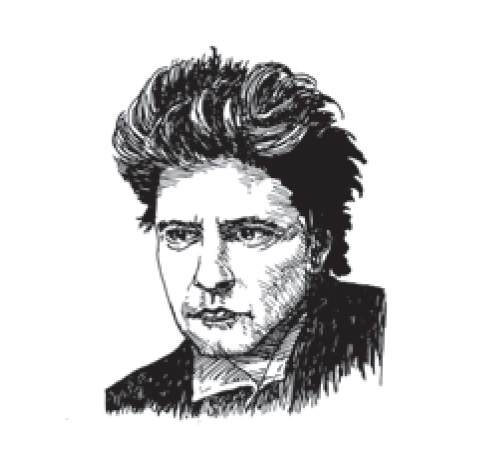A few nights after his sixty-fifth birthday, the composer Glenn Branca is standing on a street corner in downtown Manhattan, trying to find a reasonably quiet place where we can talk and smoke and drink Sambuca. Despite the warm weather, he’s dressed in his customary outfit: black shirt, black slacks, sweeping black coat with a half dozen pens in the top pocket. His voice is coarse, his teeth chipped; he looks and sounds like a relic from Ed Koch’s New York. “We could go to the Manhole,” he says wryly. “It’s the filthiest, most disgusting gay bar in the whole city. It’s been there for, like, forty years. I’ve never been, but I had a friend who used to go. He got hepatitis B there.”
Branca’s oeuvre lies at the juncture of classical and punk. Theoretical Girls, his late-’70s experimental rock band, was a crucial part of the then-burgeoning “no wave” scene. His record label, Neutral, released early albums by Sonic Youth and the Swans, both of which included members who had performed in his group the Glenn Branca Ensemble, a rock group with a phalanx of guitarists. Over a four-decades-long career, he has written for customized instruments and traditional orchestras, but it is for his guitar symphonies—including, most famously, Symphony no. 13 (“Hallucination City”), which was written for one hundred guitars and performed at the base of the World Trade Center in June of 2001—that he will most likely be remembered. His aesthetic is by now well established: strange tunings, extreme volume, and relentless dissonance that culminates in a sustained climax that is often unsettling, hypnotic, and, somehow, gorgeous. While many of his contemporaries have blazed out or disappeared, Branca has kept working, carving out a reputation as an icon of New York’s avant-garde music scene.
Despite his distinguished career, Branca cuts the figure of a beleaguered man. Burned bridges bar him from gigs. His landlord is desperate to give him the boot to free up the rent-stabilized apartment in which he has lived for the last decade. He is struggling to find a publisher for his forthcoming autobiography, tentatively titled Running Through the World Like an Open Razor. “I’ve known a lot of writers,” he says, drawing on a cigarette, “and they’re competitive and always broke. Nobody will help you. I used to help everybody, but I’m through with that. Every single person I’ve ever helped has screwed me.”
We settle for a Thai restaurant that has neither Sambuca nor a garden in which to smoke but that is at least relatively quiet. He orders a Johnnie Walker Black on the rocks. When the waiter botches my order and brings me a...
You have reached your article limit
Sign up for a digital subscription and continue reading all new issues, plus our entire archives, for just $1.50/month.
Already a subscriber? Sign in





